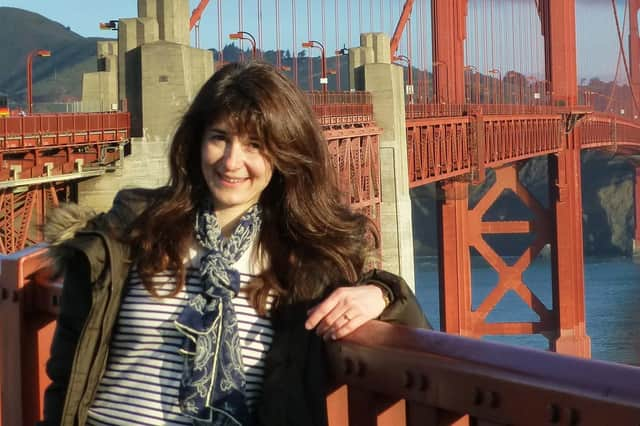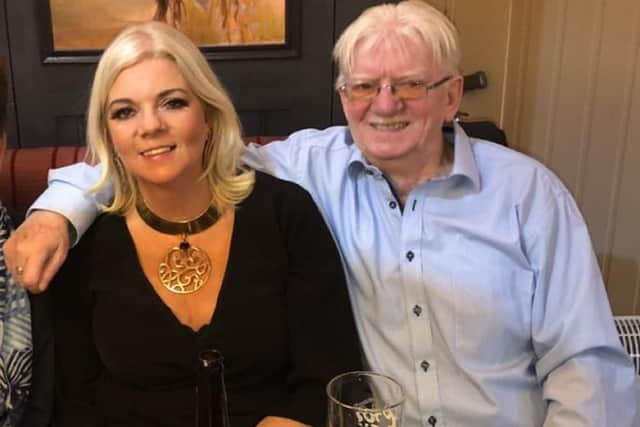Broken-heart syndrome patients more likely to die than the general population, according to Scottish research
The study looked at patients with takotsubo cardiomyopathy, which can be triggered by extreme emotional distress

 Professor Dana Dawson who led a team of researchers who found patients with so-called broken heart syndrome are more likely to die than the general population.
Professor Dana Dawson who led a team of researchers who found patients with so-called broken heart syndrome are more likely to die than the general population.
Picture: PA Wire
Patients[1] with so-called broken heart syndrome are more likely to die than the general population, according to new research. The study looked at patients with takotsubo cardiomyopathy, which can be triggered by extreme emotional distress, and compared them with heart attack patients and the general population over several years. It found takotsubo patients were prescribed the same medication as heart attack patients but these did not improve the survival rate of the former and were of uncertain benefit.

 Michelle Canning with her father, Tommy. Michelle was diagnosed with takotsubo cardiomyopathy in January 2021 and was told it was most likely triggered by the sudden death of her father Tommy three months earlier
Michelle Canning with her father, Tommy. Michelle was diagnosed with takotsubo cardiomyopathy in January 2021 and was told it was most likely triggered by the sudden death of her father Tommy three months earlier
Researchers found patients with takotsubo had a worse survival rate than the general population and were just as vulnerable to dying as patients who had had a “true” heart attack.
The team, led by Professor Dana Dawson from the University of Aberdeen Cardiology and Cardiovascular Research Unit, analysed data from 3,720 people, including 620 who had takotsubo syndrome between 2010 and 2017. Of the 3,720 study participants, 153 with takotsubo died over the median of 5.5 years follow-up, exceeding mortality rates in the general population. Prof Dawson said the data shows “quite starkly” that takotsubo syndrome, which is more common in women, is not being treated correctly and more research is needed.
She said: “Takotsubo cardiomyopathy can be triggered by extreme emotional distress, leading to its nickname of broken-heart syndrome. “It happens as a reaction to upsetting events such as the death of a family member, the ending of a relationship, or illness, when distress signals travel from the brain to the heart. But understanding is growing and there is evidence that it can be caused by other factors, including physical trauma or no incident at all.
“Takotsubo cardiomyopathy happens when one of the heart’s chambers, the left ventricle, suddenly balloons and weakens. The heart then can’t pump blood around the body as before and the extra stress leads to heart failure. It can develop at any age, and typically affects more women than men.
“Symptoms can appear like a heart attack including shortness of breath and chest pain. “But takotsubo cardiomyopathy is a different condition entirely and, unlike a heart attack, patients don’t suffer from a blockage of the arteries that supply the heart with blood.” Takotsubo syndrome is usually temporary and many people make a full recovery.
The study used data from Public Health Scotland[2], which provides accurate statistics on patient treatment and follow-up, including medication prescribed across their lifetime. Prof Dawson said researchers were “surprised” to see takotsubo patients were medicated in the same way as patients with “classical heart attacks”. She said: “Our data shows quite starkly that we are not treating this condition correctly.
“These patients have increased mortality compared to the general population, an increased vulnerability to developing heart conditions, and as much chance of dying from this as people who have suffered heart attacks. “It is vital that we identify precise ways to treat this unique group of people, and that is what we plan to do as we continue our research. “This study has identified one drug as a potential breakthrough with promising therapeutic benefit, however further research is needed to establish if this is the key to treating this devastating illness.”
The study, published in JACC: Advances, was funded by the British Heart Foundation (BHF). Dr Sonya Babu-Narayan, BHF associate medical director, said: “These data from Scotland show that the diagnosis of takotsubo, a condition more common for women, is linked to a higher chance of death in the long term. “Patients surviving takotsubo syndrome were treated much the same way as those surviving a heart attack – but unlike for heart attack survivors, being prescribed usual heart medications was of uncertain benefit.
“More research into takotsubo could better reveal its causes and which treatments could save and improve lives.”
‘Easygoing’ mother’s shock at stress-induced broken-heart syndrome diagnosis
A mother-of-three has told of her shock at being diagnosed with broken-heart syndrome following her father’s death as she called for more awareness of the condition.
Michelle Canning was diagnosed with takotsubo cardiomyopathy in January 2021 and was told it was most likely triggered by the sudden death of her father Tommy three months earlier. Ms Canning, who was 49 at the time, experienced pain in her chest and arm on her way to a routine doctor’s appointment one morning. Initially she wrote it off as indigestion but when she arrived she told her GP, who conducted an electrocardiogram test and she was admitted to the Royal Victoria Hospital in Belfast for treatment.
The mother, who is from Belfast, does not smoke or regularly drink alcohol, and at the time she was vegan and exercised multiple times a week. An angiogram revealed her arteries were clear and there was no coronary damage to her heart. She was then diagnosed with takotsubo cardiomyopathy, which can be triggered by stressful events.
She said: “I’m a very easygoing being, I don’t get very stressed and I’m not very dramatic – I take things in my stride. So this was a shock to know that I had developed this condition as a result of stress. “None of it made sense, but the reality is that stress was manifesting itself physically when I did not feel stressed, and that’s frightening.”
A former journalist who went on to a career in crisis communications, she has since recovered and is keen to raise awareness about takotsubo. Ms Canning welcomed research led by Professor Dana Dawson, from the University of Aberdeen Cardiology and Cardiovascular Research Unit, which found patients who suffer from takotsubo are more likely to die than the general population. She said: “There needs to be more awareness in current healthcare settings and in professionals to tell someone who’s had takotsubo, here is what has happened, this is the plan for recovery and here are the people you can contact.
It must be tailored to the condition. “Fortunately, the condition is reversible and I am now recovered. However, there is a chance of a recurrence.
All I can do is try to manage stress, but then I am stressed by the fact I’ve had this rare condition and it could happen again. There is nothing that I can do to prevent that. “Everything I do from here on in will be shaped by my experience in a way I couldn’t have possibly known about, but I’m blessed and very lucky that there appears to be no damage and that I am alive and well.
Others have not been as fortunate.”
She said she wants to share her experience in the hope it helps others get the right treatment and care.
References
- ^ Patients (www.scotsman.com)
- ^ Public Health Scotland (www.scotsman.com)